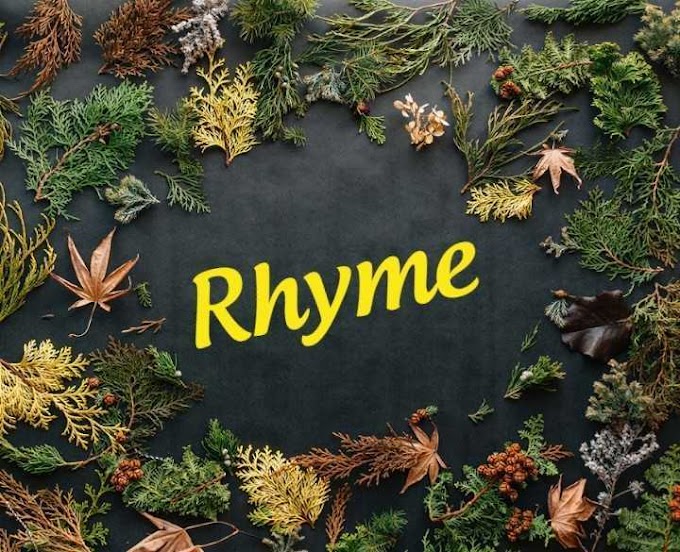LITERARY DEVICES / POETIC DEVICES
● What are literary devices?
● What are poetic devices?
● Important literary devices.
● Terms of poetry.
Literary devices (Poetic devices) are the tools, methods or the techniques which a poet uses in his/her poem to add beauty and soul to the poetry. These are the ornaments, artistic beauty and techniques which a writer uses to decorate, to create melody, to attract, to show magic in his/her work.
It is used not only to create artistic beauty but also to give the reader a better understanding of the work. It evokes a feeling of appreciation and amazement in the heart and mind of the reader. It is also used in speeches or general communication to add effect, beauty and impression on the audience or the listener.
To understand a poem we must have the knowledge of technique. There are many literary devices or poetic devices that are used by the poets, writers, authors, speakers, etc in their works or in daily life.
Important literary devices :
1. Rhyme
2. Meter & Feet
3. Rhythm
4. Stanza
5. Simile
6. Metaphor
7. Alliteration
8. Assonance
9. Consonance
10. Personification
11. Imagery
12. Symbolism
13. Allegory
14. Diction
15. Apostrophe
16. Enjambment
17. Allusion
18. Hyperbole
19. Couplet
20. Quatrain
21. Euphemism
22. Portmanteau
23. Ekphrasis
24. Metonymy
25. Synecdoche
26. Euphony
27. Cacophony
28. Onomatopoeia
29. Punctuation
(The list is long)...
We will explain to you in detail, one by one, the most important and prominent literary devices/ poetic devices that are often used in English Literature.
Some very important poetic terms:
1. Syllable- a unit of pronunciation or a part of a word (even it can be a whole word) that contains a single vowel sound. Syllables are dependent on the vowel sounds, generally. The break/s while uttering a word LOUDER can help in denoting the numbers of syllables.
Eg-
● The, be, a, home, sun, sound, etc have one syllable.
● Louder(lou-der), water(wa-ter), mango(man-go), buffet(bu-ffet), etc have two syllables.
● Inferno(in-fer-no), excellent (ex-ce-llent), hospital (hos-pi-tal), etc have three syllables.
NOTE- the vowels of the alphabet (a,e,i,o,u) are not the same as the vowels of speech sound.
2. Stressed syllable- a syllable (or more than one syllable) in a word that gets more emphasis: a little louder, higher in pitch, longer in duration, change in tone while utterance is(are) called stressed syllable(s). It is also known as a strong syllable.
Eg-
● Power(po-wer), relax(re-lax), foundation (foun-da-tion), Italian(I-ta-li-an), etc. The syllables marked in bold are stressed syllables.
3. Unstressed syllable- a syllable (or more than one syllable) in a word that is not given any emphasis while utterance is called unstressed syllable. It is also known as a weak syllable.
Eg-
● Power(po-wer), relax(re-lax), foundation (foun-da-tion), Italian(I-ta-li-an), etc. The syllables not marked in bold are unstressed syllables.
4. Accent- the emphasis on the stress of a particular syllable, while pronunciation.
5. Tone- the change in the pitch of the voice . Pitch is the frequency of loudness of the voice. The change is from high pitch to low pitch and from low pitch to high pitch.
6. Verse line- a line of metrical composition; a poem. A verse line is a line of poetry. Compositions written in meter are also called verse.
7. Foot- a unit of measurement for the number of syllables in a poetic/verse line. It is the combination of stressed and unstressed syllables forming a group. Each group consists of two or three syllables and thus it makes a foot. Plural of foot is called feet.
To know more about Foot in poetry please click here.
8. Figurative language- a language that uses normal or simple or common words in such an interesting way that it gives complex, deeper, unique and different layers of meanings which are different from the literal meaning of the words.
9. Refrain- a phrase, or a line, or a part of a line, or a group of lines, which is regularly repeated throughout the poem, usually at the end of each stanza. The repetition may have minor changes. Commonly found in Ballads.
10. Caesura- a phrasal pause or a break within a verse line. It is denoted by ' // ' (parallel sign) while scanning a verse line. It usually occurs at the middle of a verse line.
Eg-
● I’m nobody! // Who are you?
(Emily Dickinson's I'm nobody! Who are you?).
● Its loveliness increases; // it will never
(John Keats' Endymion).








2 Comments
Thanks for explaining Syllable, Stressed Syllble, Unstressed Syllable, Accent, Tone, Verse Line, Foot, Figrative Language. It was not clear to me before this.
ReplyDeleteWow! You explained poetic terms! I'm so much satisfied, thank you
ReplyDeleteAny doubts?
Please let us know.